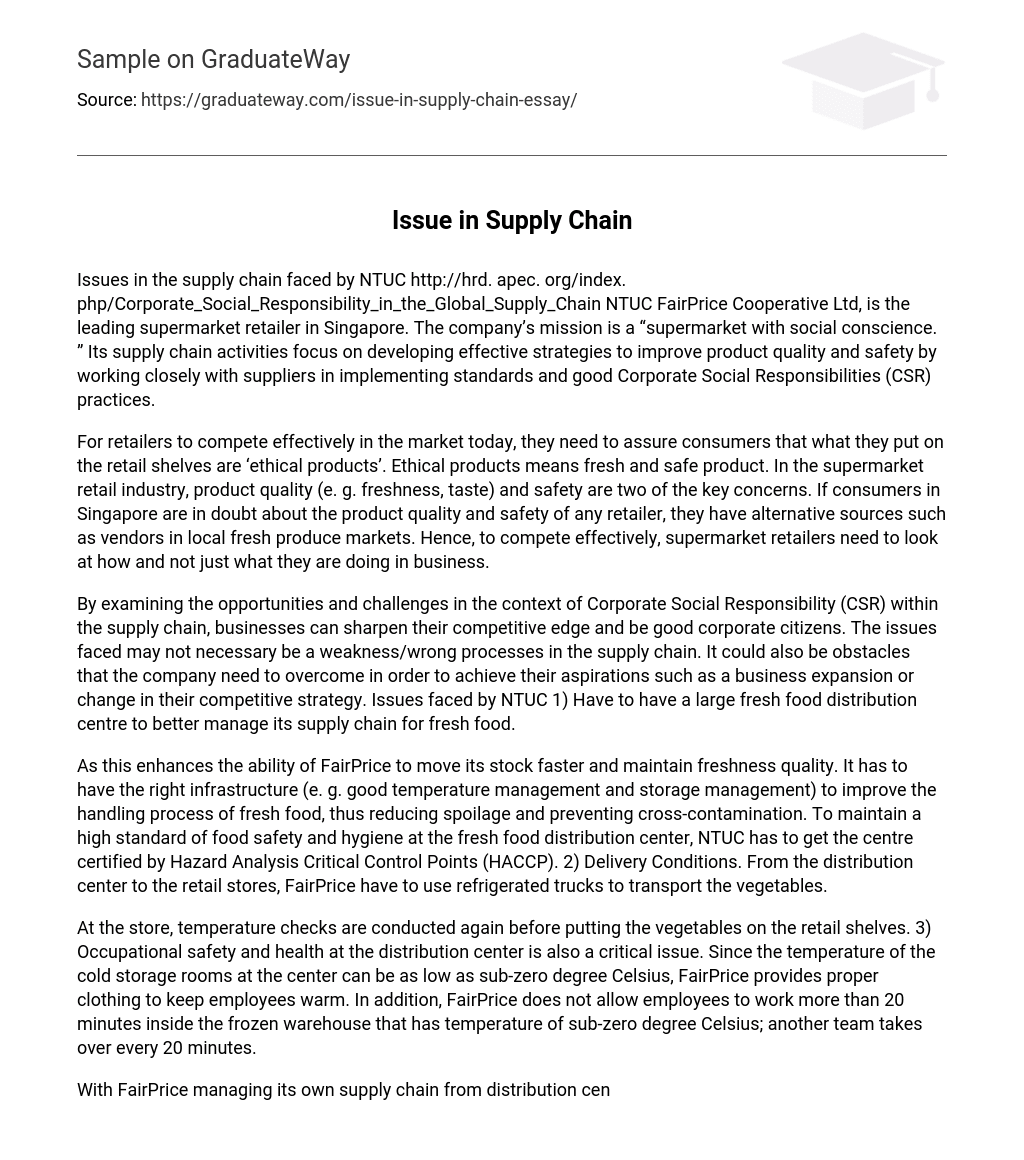Issues in the supply chain faced by NTUC http://hrd. apec. org/index. php/Corporate_Social_Responsibility_in_the_Global_Supply_Chain NTUC FairPrice Cooperative Ltd, is the leading supermarket retailer in Singapore. The company’s mission is a “supermarket with social conscience. ” Its supply chain activities focus on developing effective strategies to improve product quality and safety by working closely with suppliers in implementing standards and good Corporate Social Responsibilities (CSR) practices.
For retailers to compete effectively in the market today, they need to assure consumers that what they put on the retail shelves are ‘ethical products’. Ethical products means fresh and safe product. In the supermarket retail industry, product quality (e. g. freshness, taste) and safety are two of the key concerns. If consumers in Singapore are in doubt about the product quality and safety of any retailer, they have alternative sources such as vendors in local fresh produce markets. Hence, to compete effectively, supermarket retailers need to look at how and not just what they are doing in business.
By examining the opportunities and challenges in the context of Corporate Social Responsibility (CSR) within the supply chain, businesses can sharpen their competitive edge and be good corporate citizens. The issues faced may not necessary be a weakness/wrong processes in the supply chain. It could also be obstacles that the company need to overcome in order to achieve their aspirations such as a business expansion or change in their competitive strategy. Issues faced by NTUC 1) Have to have a large fresh food distribution centre to better manage its supply chain for fresh food.
As this enhances the ability of FairPrice to move its stock faster and maintain freshness quality. It has to have the right infrastructure (e. g. good temperature management and storage management) to improve the handling process of fresh food, thus reducing spoilage and preventing cross-contamination. To maintain a high standard of food safety and hygiene at the fresh food distribution center, NTUC has to get the centre certified by Hazard Analysis Critical Control Points (HACCP). 2) Delivery Conditions. From the distribution center to the retail stores, FairPrice have to use refrigerated trucks to transport the vegetables.
At the store, temperature checks are conducted again before putting the vegetables on the retail shelves. 3) Occupational safety and health at the distribution center is also a critical issue. Since the temperature of the cold storage rooms at the center can be as low as sub-zero degree Celsius, FairPrice provides proper clothing to keep employees warm. In addition, FairPrice does not allow employees to work more than 20 minutes inside the frozen warehouse that has temperature of sub-zero degree Celsius; another team takes over every 20 minutes.
With FairPrice managing its own supply chain from distribution center to the retail stores, the company ensures that its operations are of high standard for both consumers and employees. In addition, the company conducts audits to determine if the workers are properly trained to handle the products. 4) Good farming practices of suppliers. FairPrice imports about 80% of its vegetables from diverse sources in China, Indonesia, Malaysia, Singapore and other places. In Singapore, FairPrice works with its local suppliers to encourage them to adopt Good Agricultural Practices for Vegetable Farming (GAP-VF) developed by AVA.
Local suppliers voluntarily participate to be GAP-VF (Please refer to Table 1): * To promote a globally recognized food safety system at source, * To promote shared responsibility in food safety, and * To provide a form of product differentiation mechanism and sharing benefits with stakeholders Though the primary objectives of GAP-VF focus more on the food safety issues, it also includes factors that take environment issues into consideration. An environment impact assessment needs to be carried out to determine if the land is suitable for farming.
The standard also provides guidance on the usage of agro-chemicals such as pesticides and fertilizers to prevent contamination and integrate pest management (IPM) and nutrient management so that the farmers can carry out sustainable farming. 5) Pre-packed products FairPrice does not focus on vegetables alone. As a retailer, a lot of products on their shelves are pre-packed. For these pre-packed products, FairPrice conducts factory audits on factories to ensure that food safety is adopted in their preparation process and premises using the criteria as shown in Table 2.





